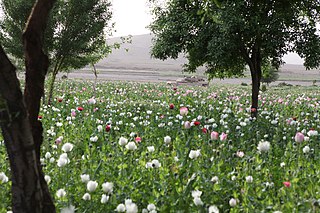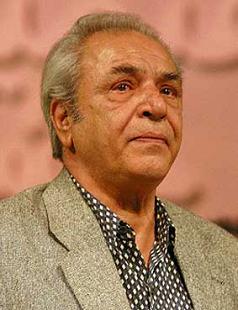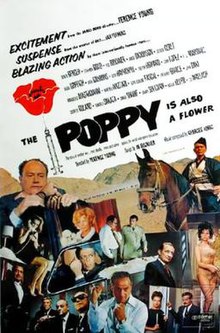
Eli Herschel Wallach was an American film, television, and stage actor from New York City. Known for his character actor roles, his entertainment career spanned over six decades. He received a BAFTA Award, a Tony Award and an Emmy Award. He also was inducted into the American Theater Hall of Fame in 1988 and received the Academy Honorary Award in 2010.

Opium is dried latex obtained from the seed capsules of the opium poppy Papaver somniferum. Approximately 12 percent of opium is made up of the analgesic alkaloid morphine, which is processed chemically to produce heroin and other synthetic opioids for medicinal use and for the illegal drug trade. The latex also contains the closely related opiates codeine and thebaine, and non-analgesic alkaloids such as papaverine and noscapine. The traditional, labor-intensive method of obtaining the latex is to scratch ("score") the immature seed pods (fruits) by hand; the latex leaks out and dries to a sticky yellowish residue that is later scraped off and dehydrated. The word meconium historically referred to related, weaker preparations made from other parts of the opium poppy or different species of poppies.

The Magnificent Seven is a 1960 American Western film directed by John Sturges. The screenplay, credited to William Roberts, is a remake – in an Old West-style – of Akira Kurosawa's 1954 Japanese film Seven Samurai. The ensemble cast includes Yul Brynner, Steve McQueen, Charles Bronson, Robert Vaughn, Brad Dexter, James Coburn, and Horst Buchholz as a group of seven gunfighters and Eli Wallach as their main antagonist. The seven title characters are hired to protect a small village in Mexico from a group of marauding bandits led by Wallach.

Sergio Leone was an Italian filmmaker, credited as the pioneer of the spaghetti Western genre. He is widely regarded as one of the most influential directors in the history of cinema.

Yuliy Borisovich Briner, known professionally as Yul Brynner, was a Russian-born actor. He was known for his portrayal of King Mongkut in the Rodgers and Hammerstein stage musical The King and I, for which he won two Tony Awards, and later an Academy Award for Best Actor for the film adaptation. He played the role 4,625 times on stage and became known for his shaved head, which he maintained as a personal trademark long after adopting it for The King and I. Considered one of the first Russian-American film stars, he was honored with a ceremony to put his handprints in front of Grauman's Chinese Theatre in Hollywood in 1956, and also received a star on the Hollywood Walk of Fame in 1960.
The year 1966 in film involved some significant events. A Man for All Seasons won six Academy Awards, including Best Picture.

The Buccaneer is a 1958 pirate-war film made by Paramount Pictures starring Yul Brynner as Jean Lafitte, Charles Boyer and Claire Bloom. Charlton Heston played a supporting role as Andrew Jackson, the second time that Heston played Jackson, having portrayed him earlier in the 1953 film The President's Lady. The film was shot in Technicolor and VistaVision, the story takes place during the War of 1812, telling a heavily fictionalized version of how the privateer Lafitte helped in the Battle of New Orleans and how he had to choose between fighting for America or for the side most likely to win, the United Kingdom.

Monica Vitti was an Italian actress who starred in several award-winning films directed by Michelangelo Antonioni during the 1960s. She appeared with Marcello Mastroianni, Alain Delon, Richard Harris, Terence Stamp, and Dirk Bogarde. On her death, Italian culture minister Dario Franceschini called her "the Queen of Italian cinema".

Cast a Giant Shadow is a 1966 American action film based on the life of Colonel Mickey Marcus, and stars Kirk Douglas, Senta Berger, Yul Brynner, John Wayne, Frank Sinatra and Angie Dickinson. Melville Shavelson adapted, produced and directed. The film is a fictionalized account of the experiences of a real-life Jewish-American military officer, Colonel David "Mickey" Marcus, who commanded units of the fledgling Israel Defense Forces during the 1948 Arab-Israeli War.

Henri Verneuil was a French-Armenian playwright and filmmaker, who made a successful career in France. He was nominated for Oscar and Palme d'Or awards, and won Locarno International Film Festival, Edgar Allan Poe Awards, French Legion of Honor, Golden Globe Award, French National Academy of Cinema and Honorary Cesar awards.

Oliver Tobias Freitag, known professionally as Oliver Tobias, is a Swiss-born UK-based film, stage, and television actor and director.
Flight from Ashiya is a 1964 film about the U.S. Air Force's Air Rescue Service, flying from Ashiya Air Base, Japan. In this American-Japanese co-production film set in the early 1960s, a flight crew's mission is to rescue a liferaft of Japanese civilians stranded in rough seas. The film was based on the 1956 novel Rescue! by Elliott Arnold. It was released in Japan as Ashiya Kara no hiko.

Afghanistan has long had a history of opium poppy cultivation and harvest. As of 2021, Afghanistan's harvest produces more than 90% of illicit heroin globally, and more than 95% of the European supply. More land is used for opium in Afghanistan than is used for coca cultivation in Latin America. The country has been the world's leading illicit drug producer since 2001. In 2007, 93% of the non-pharmaceutical-grade opiates on the world market originated in Afghanistan. By 2019 Afghanistan still produced about 84% of the world market. This amounts to an export value of about US $4 billion, with a quarter being earned by opium farmers and the rest going to district officials, insurgents, warlords, and drug traffickers. In the seven years (1994–2000) prior to a Taliban opium ban, the Afghan farmers' share of gross income from opium was divided among 200,000 families.

Nadja Tiller was an Austrian actress in film, television, and on stage. She was one of the most popular German-speaking actresses in the international cinema of the 1950s and 1960s, receiving international recognition when she played the title role in the 1958 film Das Mädchen Rosemarie (Rosemary) in 1958, shown at the Venice Film Festival. It opened the way to international films. She often played alongside her husband, Walter Giller.

The 10th Victim is a 1965 science fiction film directed and co-written by Elio Petri, starring Marcello Mastroianni, Ursula Andress, Elsa Martinelli, and Salvo Randone. An international co-production between Italy and France, it is based on Robert Sheckley's 1953 short story "Seventh Victim".
This article deals with activities of the U.S. Central Intelligence Agency related to transnational crime, including the illicit drug trade.

Nosrat Karimi was an Iranian actor, director, make-up artist, professor, scriptwriter, and sculptor. His career spanned six decades. He was perhaps best known for his role as Agha Joon in My Uncle Napoleon and The Carriage Driver.

Maziar Partow was one of the first Iranian cinematographers and had worked as a cameraman on numerous Iranian films. He directed a few movies and edited several more, and was most well known by his title as Director of Photography.
The United Nations television film series was a series of American television films planned and developed in the 1960s for the purpose of promoting the United Nations (UN) and educating television viewers about its work. Although six films were originally planned only four were broadcast, all by the American Broadcasting Company (ABC) network between December 1964 and April 1966.















